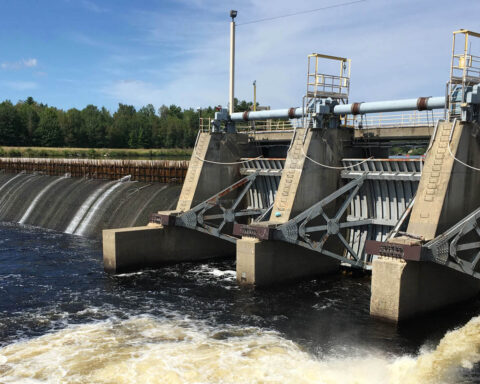The U.S. Department of Energy is turning to biofuels and other products made from algae to reduce climate pollution. The agency is offering $18.8 million in grants for research and development of products derived from algae that can replace conventional fuels, plastics and other useful byproducts.
The DOE released a funding opportunity announcement last week. The funding program, known as the Mixed Algae Conversion Research Opportunity, is overseen by the Bioenergy Technologies Office (BETO) and the Office of Fossil Energy and Carbon Management (FECM). Potential applicants must submit concept papers by May 10, and full applications are due June 27.
Jeff Marootian, the principal deputy assistant secretary for the DOE Office Energy Efficiency and Renewable Energy, said “to meet our nation’s sustainable fuel needs, we need to tap into the wide variety of biomass resources that are unique to different regions of the country.”
Biofuel is nothing new. Ethanol, a biofuel generated from corn, has been used since the 1970s. The organic matter is processed and broken into small pieces, increasing the total biomass surface area. Then, developers have a variety of methods to convert the material. The biomass can be converted to fuel by bacteria or yeast enzymes in a process called biochemical conversion. Or, developers can use thermochemical conversion, such as gasification or pyrolysis, to turn biomass into fuel with heat or chemicals.
Algae is one source the DOE is looking at to create sustainable aviation fuels. One of the leading algae biofuel companies, Viridos, has already received $2 million in federal grants to develop algae-based aviation fuel.
While crop-based biofuels such as ethanol have been around for a while, algae has shown potential as a feed stock for biofuels because it does not diminish the food supply, and it requires less space to grow large quantities. Despite the potential, the commercialization of algae-based fuels has had setbacks, including Exxon Mobil pulling funding from its algae program in 2023 after 12 years in development.
With the funding announcement, the Department of Energy is looking to accelerate research into algae biofuels and overcome the hurdles needed for mass production. In addition to replacing climate-polluting fossil fuels, the process of creating biofuels can also pull carbon dioxide out of the atmosphere.
“Research and development through the funding announced today will advance the commercial adoption and integration of these technologies with carbon capture from industrial and power facilities to help fight climate change, while also creating new jobs and opportunities in communities across the country,” said Brad Crabtree, assistant secretary of fossil energy and carbon management at the Department of Energy.
The Department of Energy is looking for proposals that fall into two categories. The first is focused on seaweed – also known as macroalgae – and research projects to convert seaweed into biofuel and fuel byproducts. The second category is for research on ways to turn carbon dioxide from industrial sources in the process of generating algae and converting it into products that can be used by the agriculture industry.
“Learning how to better convert and utilize feedstocks like seaweed allows us to expand the bioeconomy and cut greenhouse gas emissions in the process,” Marootian said.

Photo courtesy of the Department of Energy

















